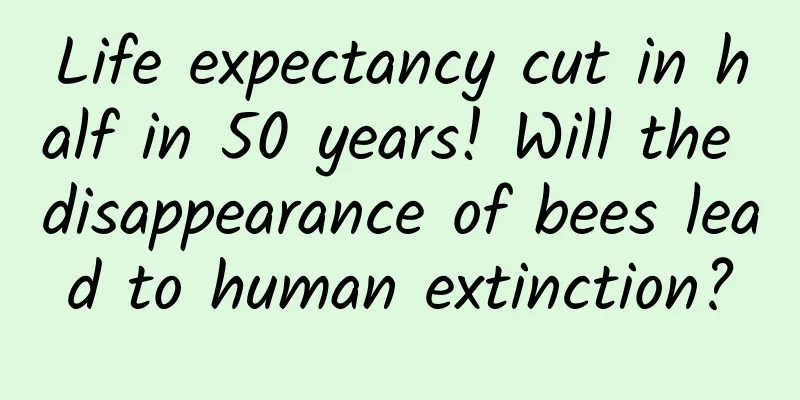Life expectancy cut in half in 50 years! Will the disappearance of bees lead to human extinction?

|
Recently, the University of Maryland published a new study in the journal Scientific Reports: Under controlled laboratory conditions, the lifespan of bees raised today is 50% shorter than in the 1970s. The average lifespan of bees raised today is 17.7 days, compared to 34.3 days in the 1970s. When compared to bees in a natural environment, the trend was surprisingly consistent. To find out why, the researchers considered various factors such as pesticides, environmental stress, parasites, nutrition, etc. The results showed that the overall decline in bee lifespan may be due to genetic factors. Image source: China Bee Industry Magazine 1 Tiny bee, big impact "Without insects doing this free pollination work, many plants will become extinct - these plants originally kept the soil alive and added nutrients to the soil. Once these plants become extinct, the soil will become dry and infertile, which will seriously affect the entire ecosystem of the area." —Rachel Carson Silent Spring: Green Waterfalls of the Earth Bees are the core of the pollination network. As pollinating insects, bees spread pollen diligently all over the world, directly related to the pollen spread of 76% of the world's food crops and 84% of plants. Each bee can collect 500,000 to 700,000 grains of pollen, allowing plants to be fully fertilized, which has a wide range of benefits for both crop yield and quality. Source: Food and Agriculture Organization of the United Nations Bees affect crop yields. Bees are the main force of pollination, affecting 35% of the world's crop yields. According to the Food and Agriculture Organization of the United Nations, 91 of the 107 important crop varieties closely related to humans rely on bees for pollination. After bee pollination, 13 crops increased their yields by more than 90%, 30 crops increased their yields by 40%-90%, 27 crops increased their yields by 10%-40%, and 21 crops increased their yields by less than 10%. Image source: Reference 1 Bees create huge economic value. The results of a study by the Chinese Academy of Agricultural Sciences Bee Research Institute show that the economic value of bee pollination to the production of 36 crops reached 304.22 billion yuan, accounting for 36.25% of the total crop output value, equivalent to 12.30% of the country's total agricultural output value. It is estimated that bee pollination can create $15 billion in value for the United States each year. In addition to making honey, more is the added value of crops in terms of yield and quality due to bee pollination. Image source: China Bee Industry Magazine 2 Will the disappearance of bees lead to human extinction? Many articles have said that "If bees disappeared from the earth, humans would only survive for another 4 years. No bees, no pollination, no plants, no animals, and no humans." Is this true? Will the disappearance of bees lead to the extinction of humans? The answer is no! First of all, bees do play a big role in our daily lives, but this role is not irreplaceable. Bees are not the only ones in the world that can pollinate. There are many insects in the world, such as moths, butterflies, flies, bats, and beetles that can also transfer pollen. To a large extent, they can make up for the lack of bees, but as for efficiency, they are indeed not as high as bees. Secondly, the main crops of mankind are either wind-pollinated (corn, rice, wheat), self-pollinated (soybeans, peas), or simply cloned (potatoes), which can produce seeds and edible parts without bees. Only fruits and vegetables are related to bee pollination, such as watermelon, apple, mango and other fruits, pumpkin, loofah, cucumber and other vegetables. But the loss caused by the disappearance of bees is indeed huge! If bees become extinct, many species will also gradually disappear. For example, almonds, which are highly dependent on insect pollination, will hardly bear fruit without bees and other pollinating insects. Many rare and endangered plants can only rely on specific bees to help pollinate. If bees become extinct, their precious byproducts will also disappear. For example, honey, propolis and beeswax. Propolis has high medicinal value and is also very effective in beauty and skin care. Beeswax, as one of the few natural waxes that can be obtained on a large scale, has been widely used in the production and manufacturing of cosmetics, agriculture, medicine, food and even aerospace, electronics, military and other industries. 3 What can we do to protect bees? Bees not only provide a large amount of food, medicine, nutrition, etc. for humans, but also spread pollen for crops, fruit trees, vegetables, forage, etc., greatly improving the yield and quality of crops. Using bees to pollinate field plants and greenhouse plants is an inevitable trend in modern agricultural production. Therefore, measures should be taken to protect bees. Create a good living environment for bees to ensure pollination. Leave some farmland empty to create a natural habitat for bees. Plant native plants with different flowering periods to form hedgerows. Plant sunflowers, coffee trees, avocado trees, and mango trees to attract bees. Reduce the use of pesticides and do not damage beehives. Plant native plants in your garden to provide bees with the foods they love. Plants and pollinators have a symbiotic relationship. They need each other to survive and evolve. Planting a variety of native plants with different flowering periods will help pollinators survive. Increase your knowledge of bees and overcome your fear. Through learning, you will find that not all bees sting, they swarm to protect themselves and do not intend to hurt people. By understanding how to respect bees, we can avoid being attacked by bees and learn to live in harmony with this important creature. Image source: Agricultural Science Experts Online Finally, we hope that the day when bees disappear never comes. Sources: China Bee Industry Magazine, Science Rumor Refutation, Digital Beijing Science Center, Agricultural Science Experts Online, Vegetative Shi Jun Weibo References: [1] Yao Jun, Yao Peichen. Small bees have a big impact[J]. Knowledge is power, 2020, (05): 24-27. [2] Li Weisan. On the special role of honey bees in ecological agricultural systems[J]. Chinese Bee Industry, 2010, 61(03): 50-51. END Editor: Guru |
<<: How to go out if you can’t buy N95? Try DIY a cotton mask
Recommend
This seasoning is toxic and carcinogenic after heating? You may have been deceived for too many years...
In recent years, MSG has disappeared from many pe...
Product activity operation and promotion planning plan!
Activities are a very important way to quickly at...
The latest news about the 2022 Zhurong: When will it land on Mars? Why is there no movement?
Zhurong is the Mars rover for the Tianwen-1 missio...
Practical transfer! What should I do if I have coughs and pains after turning negative?
If you have questions about the coronavirus Espec...
Installing cameras at home? Not recommended
Recently, the topic #Police recommend not to inst...
Sun Wukong couldn't get out of Tathagata's palm, and there's actually a physics reason behind this!
The Arctic tern is perhaps the most light-loving ...
Xiaohongshu KOL promotion: the secret of popular notes!
As self-media and internet celebrities became mor...
Hisense in the US becomes a foundry, Sharp in America may be snatched away by Foxconn
In April this year, Foxconn finally acquired 66% ...
Android Training - Managing your app's memory
Random Access Memory (RAM) is a valuable resource...
Use day cream during the day and night cream at night? Can I use whatever I want?
Reviewer: Yang Rongya, Chief Physician, Seventh M...
How to attract attention through short video operations?
Anyone who has done a little research on short vi...
Zhang Fan: Strange Creatures in the Black Water
"This is the kingdom of plankton. Anemones, ...
What is the principle of anti-peeping film?
Privacy screens work in a similar way to blinds. ...
Are TV games revisiting classics game remakes or just rehashing old stuff?
Remaking classic games from the past and releasin...
2016 Christmas Advertising Video Collection 2: Warmth makes winter no longer cold!
The annual Christmas is coming soon in this cold ...









